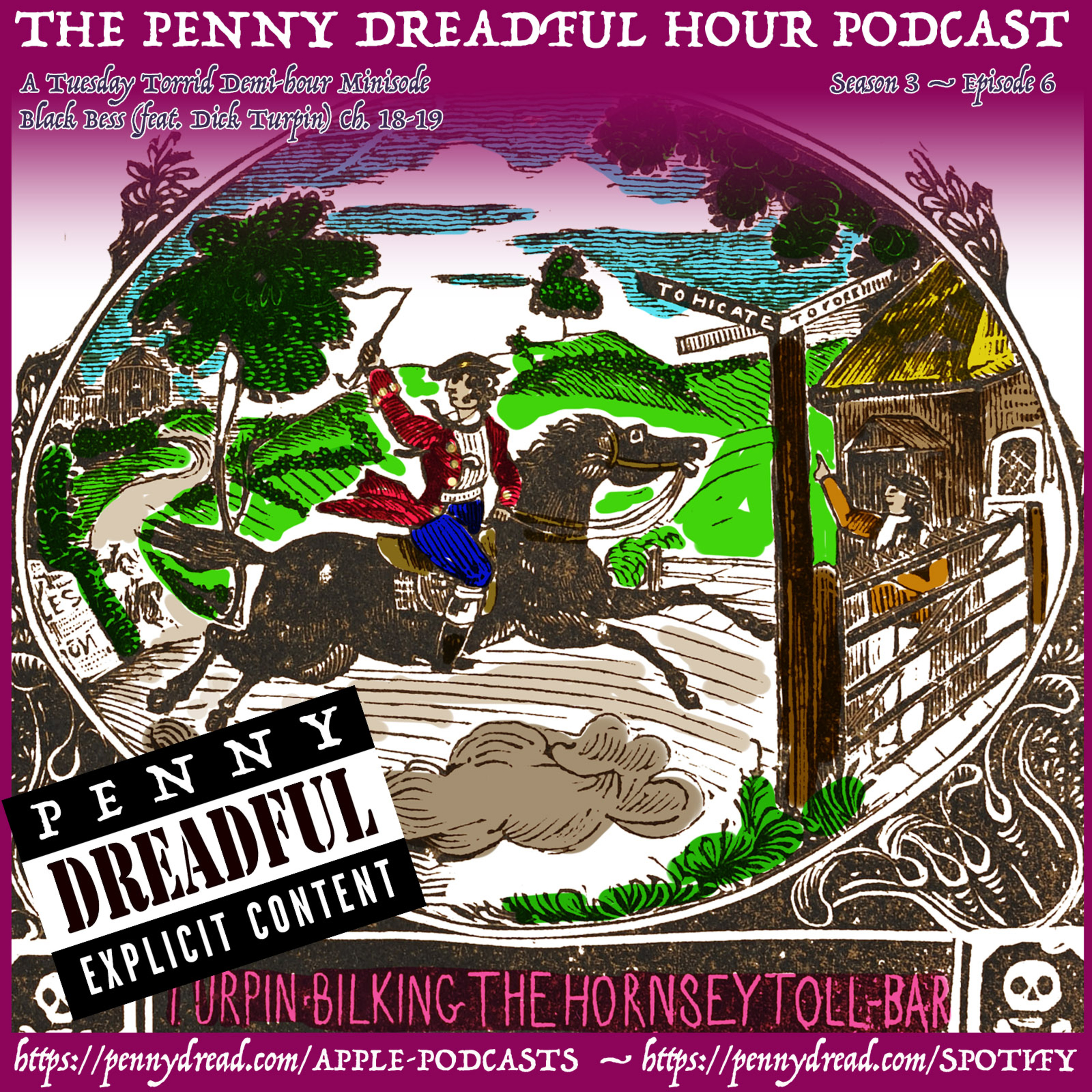3.05: Highwayman Dick Turpin is nabbed!... or is he? — The Jolly Fishmonger. — "My Wife's Funny Thing" (yes, that's exactly what he's singing about!) (A Twopenny Torrid minisode)
- Author
- Finn J.D. John/ Pulp-Lit Productions
- Published
- Wed 27 Aug 2025
- Episode Link
- https://podcasters.spotify.com/pod/show/gdt3k/episodes/3-05-Highwayman-Dick-Turpin-is-nabbed-----or-is-he---The-Jolly-Fishmonger---My-Wifes-Funny-Thing-yes--thats-exactly-what-hes-singing-about--A-Twopenny-Torrid-minisode-e37ajai
A "spicy" (-ish) Tuesday Twopenny Terrible minisode IN WHICH —
0:01:22: HIGHWAYMAN DICK TURPIN, Ch. 18-19, IN WHICH —:
- Leaving the church, Dick strikes out on foot for London, hoping to get Black Bess back. Then he meets a farmer with a wagon load of turnips and carrots, heading for Covent-garden market. The farmer gives Dick a lift. But, has the farmer recognized him? Will he try to turn him in and collect the £1000 reward? We shall see.
0:19:29: THREE SALACIOUS SALOON SONGS:
- "The Jolly Fishmonger," a frisky supper-club "flash song" from the 1830s, of the type sung lustily by, um, gentlemen when there were no ladies about. This one tells the story of the amorous adventure of a Strand fishmonger using as many fish and fishing puns as possible.
- "Madam Sneak," which tries more for funny than sexy. The last word of every line is omitted from the original text, but it's "arse."
- "My Wife's Funny Thing." Yes, it's THAT funny thing. It's nothing less than a whole 35-line drinking-song about lady-bits, phrased carefully enough that even George Carlin could sing it on TV without getting in trouble.
Join host Finn J.D. John. for a half-hour-long spree through the scandal-sheets and story papers of old London! Grab a decanter and top off your glass, unload your stumps, and let's go!
GLOSSARY OF FLASH TERMS USED IN THIS EPISODE:
- Roses, pinks and tulips: Aristocrats and high-society toffs.
- Knight of the brush and moon: Drunken fellow wandering amok in fields and ditches trying to stagger home.
- Chaffing: Talking and bantering while taking a glass or two.
- Crib: House, room, or chamber (modern equivalent is "joint"). Originally and still also used to refer to a prostitute's bedroom.
- Pippin: A funny fellow (of either sex); also a friendly way of greeting: How are you, my pippins?
- Bolt the moon: Fly by night
- Beaks: Magistrates, law enforcement authorities
- The tippy: The very best
FISH TERMS AND FLASH WORDS FROM "THE JOLLY FISHMONGER":
- As merry a grig: "Merry as a grig" was 1830s slang for "full of fun."
- "Reckoned a soul" means "considered a heavy drinker" — but of course "soul" is spelled like the fish here, SOLE.
- "In love with a maid" — in the 1830s "maid" meant "old maid." As a bonus, juvenile female sticklebacks are called maids. Our poet gets more mileage out of this one in the last line, although he calls the fish "thornback"; it's the same fish.
- "She dabb'd him" — "dab" meant lots of things, but one of them was to punch or slap. And, there was a type of flatfish called a dab.
- "She always delighted to play with his cod." Many possibilities here could mean his purse, or his scrotum; but the obvious reference is to a certain fish-shaped nether appendage (see: CODPIECE).
- "Would you not wish to have been in his plaice" — a plaice is a type of flatfish.
- "The neighbors smelt out" — a smelt is a type of small oily fish.
